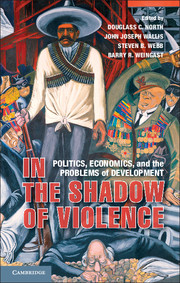Book contents
- Frontmatter
- Contents
- Contributors
- Acknowledgments
- One Limited Access Orders
- Two Bangladesh
- Three Fragile States, Elites, and Rents in the Democratic Republic of Congo (DRC)
- Four Seeking the Elusive Developmental Knife Edge
- Five Change and Continuity in a Limited Access Order
- Six India’s Vulnerable Maturity
- Seven Entrenched Insiders
- Eight From Limited Access to Open Access Order in Chile, Take Two
- Nine Transition from a Limited Access Order to an Open Access Order
- Ten Lessons
- Index
- References
Ten - Lessons
In the Shadow of Violence
Published online by Cambridge University Press: 05 December 2012
- Frontmatter
- Contents
- Contributors
- Acknowledgments
- One Limited Access Orders
- Two Bangladesh
- Three Fragile States, Elites, and Rents in the Democratic Republic of Congo (DRC)
- Four Seeking the Elusive Developmental Knife Edge
- Five Change and Continuity in a Limited Access Order
- Six India’s Vulnerable Maturity
- Seven Entrenched Insiders
- Eight From Limited Access to Open Access Order in Chile, Take Two
- Nine Transition from a Limited Access Order to an Open Access Order
- Ten Lessons
- Index
- References
Summary
Thinking of developing countries as limited access orders with their own social dynamic rather than as flawed or incomplete open-access societies affords new insights into the impediments and paths to development. The perspective distinguishes between two development problems that are normally conflated. The second development problem involves the transition of societies from LAOs to OAOs. The first development problem involves the movement of LAO societies toward forms of social organization that enable more economic output, reduced violence, stable political outcomes, and greater individual well-being. World Bank borrowers face the first development problem: developing as an LAO, from fragile to basic and from basic to mature LAO, while avoiding regression. The lessons we draw from the case studies presented in this volume are primarily concerned with enabling places like the DR Congo to accomplish social outcomes that more closely resemble Mexico or Zambia. We also draw lessons about making transitions to open access, but our primary focus is on the first development problem because it is first in terms of human priorities. Understanding better the logic of limited access societies and the dynamics of how they change holds out greater rewards in terms of reducing poverty and violence.
The control of violence is central to the logic of all LAOs and hence is central to the problem of development. The traditional economic development framework focuses mainly on the second development problem and fails to understand violence or incorporate an appreciation of the dynamics of violence into policy recommendations. Indeed, the Washington consensus of the 2000s was dominated by efforts to embed institutions of open-access orders – property rights, entry into markets, elections, or institutions of good governance – directly into limited access orders. Because these reforms ignore the logic of the LAO, they often fail to produce development and sometimes exacerbate the problem of violence. The traditional development perspective typically treats violence as a country-specific phenomenon and leaves dealing with violence for local police and courts. By doing so, this perspective fails to understand that LAOs are organized to prevent violence and that this often hinders traditional reform efforts.
- Type
- Chapter
- Information
- In the Shadow of ViolencePolitics, Economics, and the Problems of Development, pp. 328 - 350Publisher: Cambridge University PressPrint publication year: 2012
References
- 11
- Cited by



